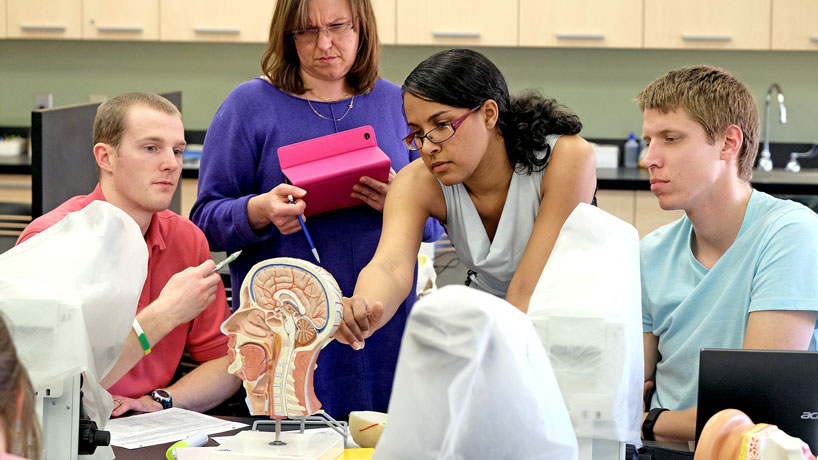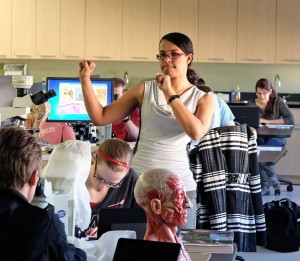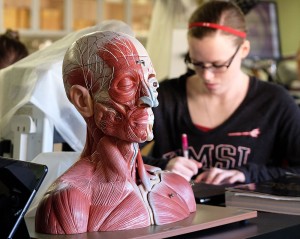
Assistant Clinical Professor of Optometry Erin Brooks teaches the anatomy of the head to students in her lab course. She went through the Bridge Program and earned three degrees from UMSL before settling into her full-time teaching position in the College of Optometry. (Photos by August Jennewein)
It’s an understatement to say that the University of Missouri–St. Louis has played a formative role in Erin Brooks’ life. In her almost 15 years at UMSL, Brooks earned three different degrees, honed her teaching skills, fell in love with vision science and became an assistant clinical professor in the College of Optometry.
The journey started when she first set foot on campus for the precollegiate UMSL Bridge Program.
“I loved it, especially that lake outside the science buildings, where we had our classes,” she said. “I did it a couple of years in the fall and winter during school. And one year I went in the summer. During the summer, I had classes in the morning and then I’d work in the afternoon. I got put in the Office of Teacher Certification and Advising.”
That introduced Brooks to teaching, where she fell in love with the thought of it as a profession, especially after her positive experience as a tutor. But when it came time to declare a major, her parents swayed her toward the sciences.
“They wanted me to make more money,” she said. “So I said, OK, fine: pre-optometry, but I chose a chemistry major intentionally so I’d have a job if I didn’t like optometry school.”
While she worked toward her bachelor’s of science degree in chemistry, she also joined the Pre-Optometry Club.
“On my first visit there I was named president-elect, which was cool because I was president when I was applying for optometry school,” Brooks said.
But the Pre-Optometry Club proved important to her in other ways, too.
“I had to go to a special club meeting where we met with current optometry students,” she said. “They showed us what they look at in patients. It was so exciting. I knew then that’s what I wanted to do. I could see myself doing that ten, 15, 20, 30 years later. I fell in love with optometry then and haven’t looked back.”
When Brooks entered the optometry program at UMSL, she had a goal of graduating in four years and working in a private practice.
“That changed pretty quickly for me,” she said. “My first year of optometry school, I actually had a classmate who was struggling with our neurology class. I helped her, and I got back those first feelings I had when I was tutoring. Helping people understand concepts – that’s a big passion for me.”
She worked as a teaching assistant for courses in the College of Optometry, while also doing clinical work in both disease and pediatrics fields.
After completing her OD and settling firmly on teaching optometry, Brooks turned to UMSL, yet again, for her third degree – a master’s degree in vision science.
“It made me a much better candidate to teach because, in most schools, you need more than just an OD,” she said. “Everybody in the field has an OD.”
At first Brooks held a part-time position in the College of Optometry, but when a full-time position opened, she leaped at it.
“My favorite thing is how friendly the optometry school is,” Brooks said. “The homey and inviting nature is overwhelming. The faculty care, and everyone is friendly. And I get to be a part of it.”
While there are some slightly awkward moments where former peers are now her students and call her “Dr. Brooks,” overall she said she feels she is doing exactly what she dreamed of.
That includes teaching ocular motility courses, neuro-ophthalmology, anatomy and physiology, and a problem-based discovery class that helps first-year optometry students learn how to diagnose based on test results and exams.
Brooks’ research focuses on optometry statistics, where she analyzes studies and helps people understand findings.
“I’m working with the Pupil Project,” she said. “It’s a joint project between education and optometry. They look at kids who are underperforming in school and help label them dyslexic or other types of learning disabilities. I’m helping understand what test is more important, what factors are more important in these kids and actually finding relationships that aren’t well-accepted in a lot of circles.”
She continues to do clinical work as well and is the attending doctor at the Center for Eye Care at the Family Care Health Center–Carondelet.
“I work with students,” she said. “We provide care for these patients who don’t have a large income. We change their lives. We have alternatives for low-cost surgery and insurances that can help them if they have no insurance and they need surgery.”
Brooks has also started a late evening clinic for busy patients who work long hours and want care for themselves and/or their children without missing work or school. It’s a cause that she is really passionate about.
“I love it. I never saw myself as any of these things – community doctor, educator, but I love all of those things.”

















